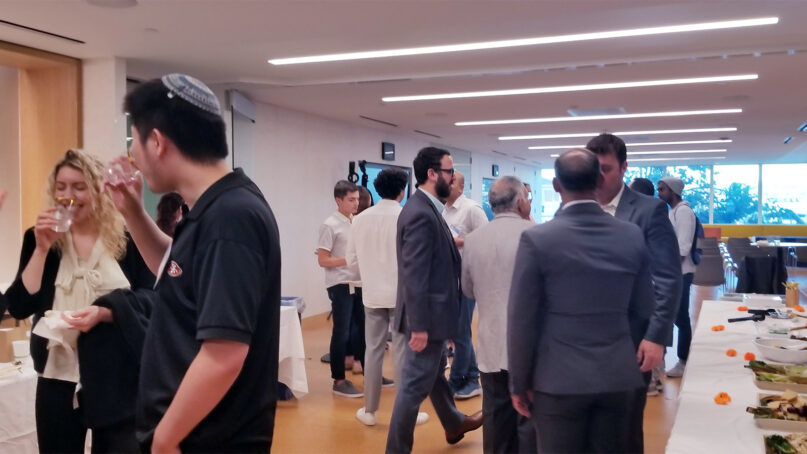(RNS) — Hindu and Jewish Americans gathered in San Francisco last Thursday to celebrate Janmashtami and Rosh Hashana together.
In the inaugural event, held by the Hindu American Foundation and the American Jewish Committee, about 40 people gathered in the AJC building across from the Embarcadero to learn about each other’s traditions, build upon similarities and share plenty of food.
“This is a way for people to socialize over shared traditions and experiences,” said Rabbi Noam Marans, the director for interreligious and intergroup relations for the AJC. “What can be more powerful than gastronomically!”
Janmashtami, the birthday of Lord Krishna, and Rosh Hashana, considered the birthday of the world, are two holidays celebrated with an abundance of sweets.
Ramya Ramakrishnan, one of the organizers of the celebration and director of community outreach for HAF, said the casual weekday event was the perfect setting for Californians young and old to network with each other. With an almost evenly divided turnout, including an appearance by Israel’s deputy council to the Pacific Northwest, Thursday’s gathering was marked with food, laughter and a genuine eagerness to understand the other, according to Ramakrishnan.
“We can be worlds apart, but the essence and meaning behind many of the traditions are the same,” said Ramakrishnan. “Everybody who attended left with a full heart and with such positive energy.”
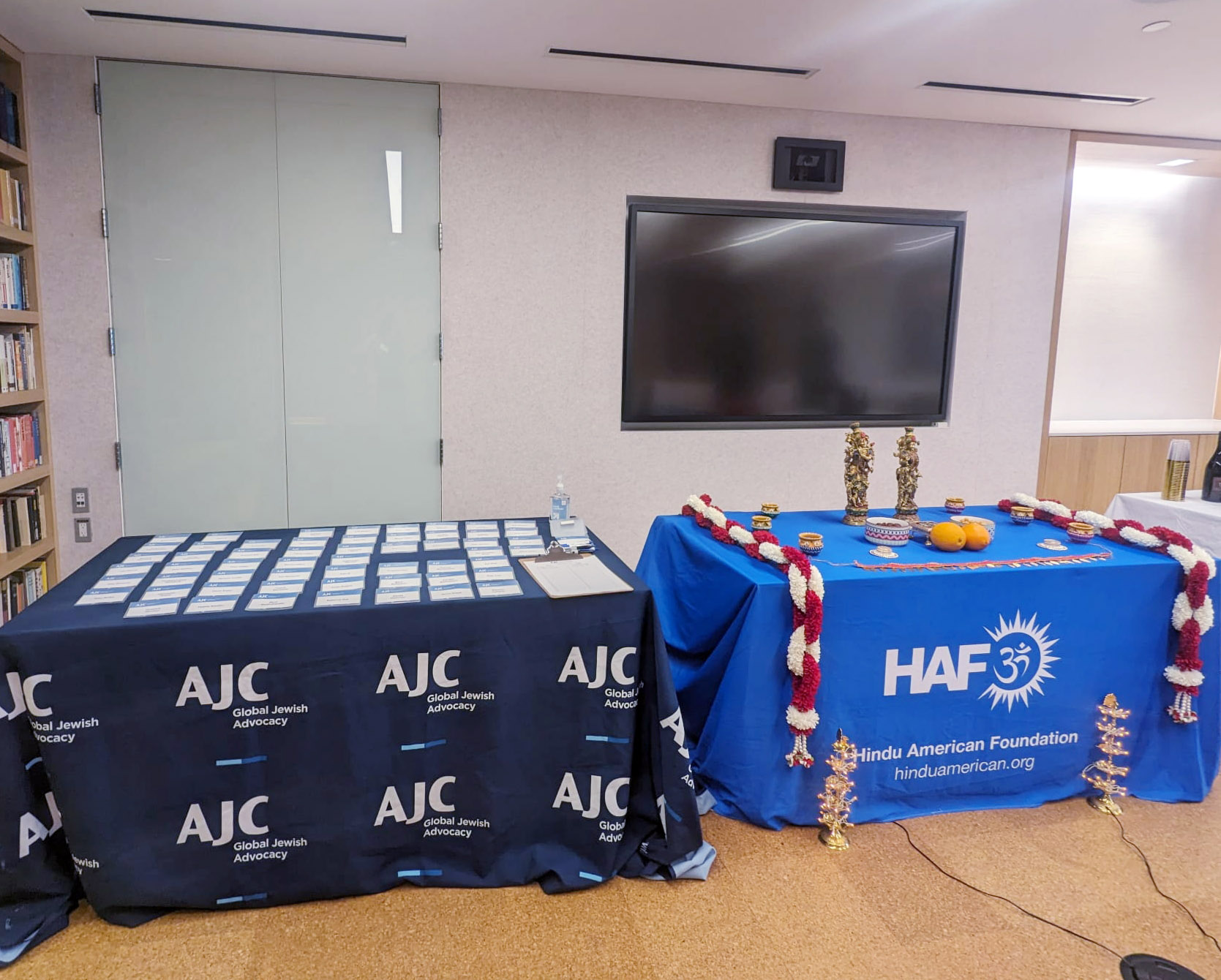
Sign in tables for a joint event held by the American Jewish Committee and the Hindu American Foundation, Thursday, Sept. 7, 2023, in San Francisco. Photo courtesy Ramya Ramakrishnan
Members of the two cultures are increasingly recognizing their commonalities as traditions — both, for example, allow for atheists under their fold — and as people groups. Hindus and Jews in the United States share similar socioeconomic status, voting patterns and, crucially, an attachment to a geographic homeland.
“We are part of the American ethos, and we don’t feel that we need to abandon our religious heritage or former national connections,” said Marans of Hindus and Jews in the United States.
Hindu and Jewish organizations also hope interreligious dialogue will lend itself to the broader goal of allyship between India, Israel and the United States. India is important to Israel, says Marans, and therefore important to the goals of the AJC and the safety and security of Jews worldwide.
“One cannot be speaking about India without understanding its Hindu significance,” he added.
To take interfaith relations seriously, Marans says, Jewish organizations must go beyond the Abrahamic traditions and engage the 1 billion adherents of Hinduism in the world.
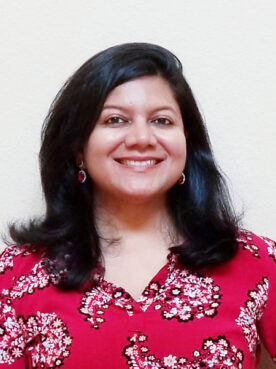
Ramya Ramakrishnan. Photo courtesy HAF
The first-ever Hindu-Jewish summit was held in 2007 in New Delhi by the World Council of Religious Leaders and co-sponsored by the AJC. In the following two years, Hindu and Jewish scholars and practitioners met in Jerusalem and then New York to discuss their varied theological approaches to the Divine and their shared challenges as minority religious groups.
“The most important thing that we learn in Hindu-Jewish relations is that both Hindus and Jews need to learn vocabulary, framework, a mindset that is not historically embedded into their respective experiences,” said Marans.
As Hindus are a much more recent immigrant group to the United States than Jews, many Hindu Americans like Ramakrishnan say the community can model itself after the Jewish diaspora, who has long faced bigotry, persecution and violence.
“They’ve gone through this decades ahead, so we feel that we have a lot to learn from them,” said Ramakrishnan. “We can support them when they need our help and vice versa, and we cherish that.”
Yet some critics of the burgeoning political relationship worry that Hindu Americans are allying too closely to pro-Israel groups, citing concerns about the commonalities between Zionism and Hindu nationalism.
As an example highlighted in a recent article from Jewish Currents magazine, many Hindus have said they face Hinduphobia through “dual-loyalty” smears about India — inspired by the working definition of antisemitism that notes the criticism of the state of Israel as constituting anti-Jewish bigotry.
“Hindu groups have used ‘the same playbook and even sometimes the same terms’ as Israel-advocacy groups, ‘copy-pasted from the Zionist context,’ said Nikhil Mandalaparthy, the advocacy director of Hindus for Human Rights, in an interview with Jewish Currents.
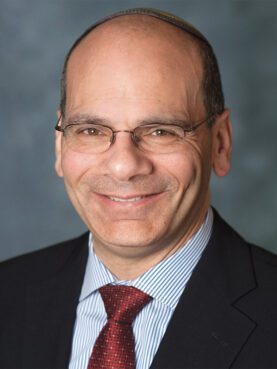
Rabbi Noam Marans. Photo courtesy AJC
Hindu American organizations have long rallied together to fight what they call Hinduphobia, the anti-Hindu sentiments faced by Indian Americans either online or in person. HAF and AJC co-released an educational pamphlet about the commonalities between antisemitism and Hinduphobia, as well as one attempting to quell misconceptions about Hindu’s use of the swastika — an ancient Dharmic symbol co-opted by the Nazis in Germany.
The ongoing discussion about the Nazi “hooked cross,” or Hakenkreuz, is undoubtedly of great sensitivity to the Jewish people, said Marans, and is thus a “remarkable” showing in American interreligious dialogue.
“American Jews, like all Americans, need to learn about their Hindu neighbors,” said Marans. “This has become even more significant as America has become more polarized.”
Rabbi Alan Brill was part of the New York Hindu-Jewish summit in 2009 and was also a panelist at the Parliament of the World’s Religions for an interfaith discussion about the swastika and Hakenkreuz. A professor of religion at Seton Hall University, Brill notes the two faiths, which go back to the Bronze and Iron Age, have more structural similarities than many other faiths — from dietary restrictions to purity rituals to cosmological inquiries.
Both traditions, he says, have had to grapple with how to apply ancient wisdom throughout modernization and reforms and against the backdrop of Western Christianity.
“You’re asking some very similar questions even if you don’t come up with the same answers,” he said.
Brill taught several introductory courses to Judaism at Banaras Hindu University on a Fulbright scholarship in 2013. During his immersion in Indian culture, Brill says he was struck to see how many of his Indian students understood the tenets and celebrations of Judaism immediately using their own Hindu frameworks.
Young people, he says, hold the key to building the Hindu-Jewish relationship, as older generations of Jews are still working through Jewish, Christian and Islamic dialogue.
“The younger generation is now living in a world of religious diversity,” said Brill. “The Hindu or the greater Indian community’s perfect point is to help us expand horizons — to understand that there is greater wisdom, greater variety and greater things to learn about what’s out there.”
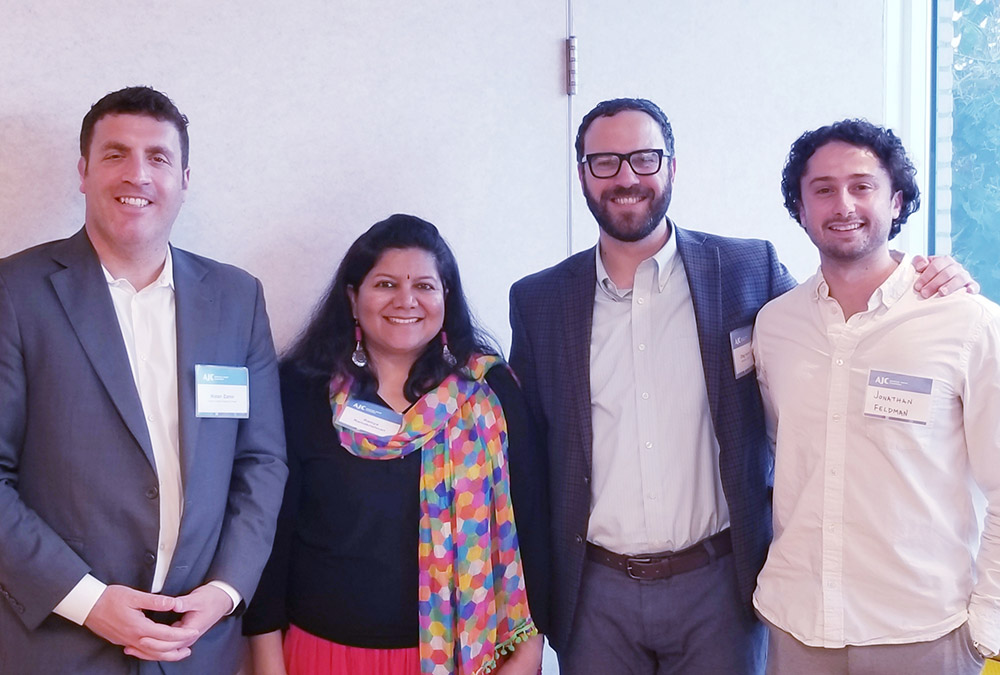
Matan Zamir, from left, Israel’s Deputy Consul General to the Pacific Northwest; Ramya Ramakrishnan, Community Outreach Director, HAF; Oleg Ivanov, Event Coordinator and Assistant Director, AJC; and Jonathan Feldman, Young Professional Leader, AJC; pose together at the event Thursday, Sept. 7, 2023, in San Francisco. Photo courtesy Ramya Ramakrishnan
Although there are still some misunderstandings that exist among the communities, such as the assumption by many Hindus that Judaism is a precursor to Christianity, or the belief by many Jews that worshipping murtis is blasphemous, Brill says Thursday’s educational event was a necessary move in the right direction.
“To do a Krishna Jayanti with full decorations and pictures, that’s already a level of rapprochement,” said Brill. “We’re willing to accept that we have completely different imagery, but we’re still going to celebrate together.”
After a successful joint holiday celebration, Ramakrishnan is sure the attendees will meet again for further interreligious events — maybe to observe Hanukkah and Diwali together, both holidays commemorating the triumph of light over darkness.
“This relationship is really unique because we’ve understood each other really well,” said Ramakrishnan. “When I was meeting people for the first time, it was as though I was meeting our friends.”
